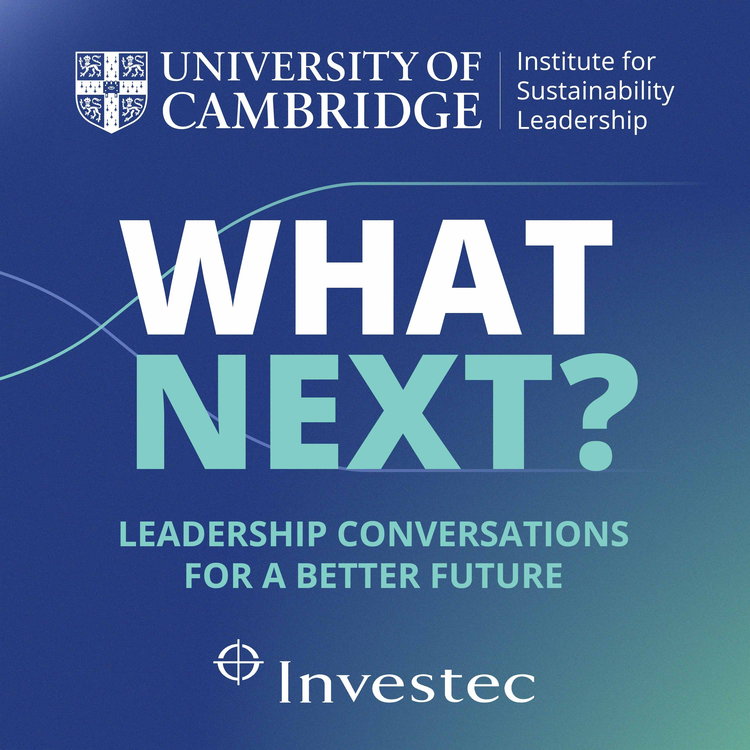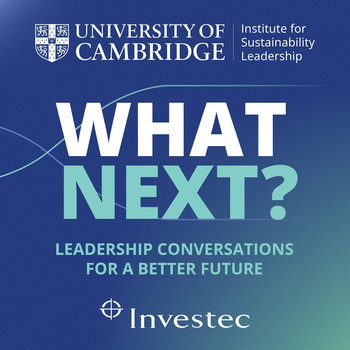
From Heavy Industry to Clean Growth with Faustine Delasalle and Katie Fergusson
Loading player...
What Next? Leadership Conversations for a Better Future explores how leaders can help build future-fit economies, bringing fresh perspectives, provocative questions and conversations with leaders shaping the future of markets, business and society.
This episode focuses on the industrial transition — how to decarbonise the “hard-to-abate” sectors that power modern economies, and how to sustainably mine the metals and minerals needed to build the clean energy infrastructure of the future. While technologies for low-carbon, resource efficient steel, cement, heavy transport and mining are advancing rapidly, deployment still lags behind what’s required. Policy signals remain inconsistent, investment is cautious, and supply chains face both physical and geopolitical constraints. The conversation examines what’s working, where momentum is building, and what kind of leadership will be needed to deliver scale and pace.
Hosts Lindsay Hooper (CISL) and Marc Kahn (Investec) are joined by:
Faustine Delasalle – CEO of the Mission Possible Partnership, working with heavy industry and energy sectors on rapid decarbonisation
Katie Fergusson – SVP, Studies & Development, Anglo American
Together they discuss how to create the conditions for cleaner industry to compete and thrive - from green steel and hydrogen to innovation, investment and the human leadership required to navigate complexity and drive real change.
In partnership with the University of Cambridge Institute for Sustainability Leadership (CISL) and Investec.
Editorial Note:
This episode focuses on the role of mining and heavy industry in accelerating clean industrial transitions. It does not attempt a comprehensive review of the sector’s environmental or social impacts. We recognise that responsible mining, community engagement, and demand-side efficiency are essential complements to the technological and policy measures discussed.
Key Quotes:
"Sustainable leadership means making space for experimentation and learning — we can’t innovate without being willing to fail fast.” — Katie Fergusson
“True leadership is not just about navigating what’s coming; it’s about shaping what’s coming.” — Faustine Delasalle
Key Takeaways:
Responsible mining is essential: The world needs critical minerals, but production must minimize carbon, water, and social impacts.
Partnership drives progress: Collaboration across sectors, supply chains, and governments accelerates innovation and de-risks transition investments.
Policy stability matters: Clear, long-term frameworks give investors confidence to back new technologies and infrastructure.
Innovation must scale: Bridging the gap between pilot projects and deployment requires new financing, mindset shifts, and regulatory agility.
Leadership in complexity: Future leaders must balance vision with adaptability, combining commercial insight with social and environmental responsibility.
Credits
Presented by:
Lindsay Hooper, Chief Executive, CISL
Marc Kahn, Chief Strategy & Sustainability Officer, Investec
Produced by: Carl Homer (Cambridge TV) & Alexa Sellwood
Executive Producer: Gillian Secrett
In partnership with: Investec
Listen and Subscribe:
Available on all major podcast platforms or visit the Leadership Hub on the CISL website or Investec Focus for more episodes and insights.
Disclaimer:
The views in this podcast are those of the contributors, and don’t necessarily represent those of CISL, the University of Cambridge, or Investec, and should not be taken as advice or a recommendation.
This episode focuses on the industrial transition — how to decarbonise the “hard-to-abate” sectors that power modern economies, and how to sustainably mine the metals and minerals needed to build the clean energy infrastructure of the future. While technologies for low-carbon, resource efficient steel, cement, heavy transport and mining are advancing rapidly, deployment still lags behind what’s required. Policy signals remain inconsistent, investment is cautious, and supply chains face both physical and geopolitical constraints. The conversation examines what’s working, where momentum is building, and what kind of leadership will be needed to deliver scale and pace.
Hosts Lindsay Hooper (CISL) and Marc Kahn (Investec) are joined by:
Faustine Delasalle – CEO of the Mission Possible Partnership, working with heavy industry and energy sectors on rapid decarbonisation
Katie Fergusson – SVP, Studies & Development, Anglo American
Together they discuss how to create the conditions for cleaner industry to compete and thrive - from green steel and hydrogen to innovation, investment and the human leadership required to navigate complexity and drive real change.
In partnership with the University of Cambridge Institute for Sustainability Leadership (CISL) and Investec.
Editorial Note:
This episode focuses on the role of mining and heavy industry in accelerating clean industrial transitions. It does not attempt a comprehensive review of the sector’s environmental or social impacts. We recognise that responsible mining, community engagement, and demand-side efficiency are essential complements to the technological and policy measures discussed.
Key Quotes:
"Sustainable leadership means making space for experimentation and learning — we can’t innovate without being willing to fail fast.” — Katie Fergusson
“True leadership is not just about navigating what’s coming; it’s about shaping what’s coming.” — Faustine Delasalle
Key Takeaways:
Responsible mining is essential: The world needs critical minerals, but production must minimize carbon, water, and social impacts.
Partnership drives progress: Collaboration across sectors, supply chains, and governments accelerates innovation and de-risks transition investments.
Policy stability matters: Clear, long-term frameworks give investors confidence to back new technologies and infrastructure.
Innovation must scale: Bridging the gap between pilot projects and deployment requires new financing, mindset shifts, and regulatory agility.
Leadership in complexity: Future leaders must balance vision with adaptability, combining commercial insight with social and environmental responsibility.
Credits
Presented by:
Lindsay Hooper, Chief Executive, CISL
Marc Kahn, Chief Strategy & Sustainability Officer, Investec
Produced by: Carl Homer (Cambridge TV) & Alexa Sellwood
Executive Producer: Gillian Secrett
In partnership with: Investec
Listen and Subscribe:
Available on all major podcast platforms or visit the Leadership Hub on the CISL website or Investec Focus for more episodes and insights.
Disclaimer:
The views in this podcast are those of the contributors, and don’t necessarily represent those of CISL, the University of Cambridge, or Investec, and should not be taken as advice or a recommendation.
Chapters
- 00:00 Chapter 1 — What Resources will Future Economies Require? (00:00–11:30)
- 11:30 Chapter 2 — Innovation, Collaboration, and Scale (11:30–23:00)
- 23:00 Chapter 3 — More Mining, Less Extraction (23:00–27:30)
- 27:30 Chapter 4 — Leadership and the Just Transition (27:30–36:30)

